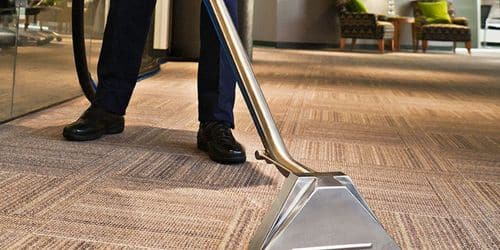Do you want to learn how to start a carpet cleaning business?
Starting your own business could be the ideal way to pursue your entrepreneurial dreams while providing in-demand services.
As the owner, you will have complete control over your business. The financial benefits of running a successful business make the time and effort required to get it up and running worthwhile. However, becoming the owner of a carpet cleaning business necessitates some specific knowledge. This article addresses some of the most frequently asked questions about starting a carpet cleaning business.
How To Start a Carpet Cleaning Business In 8 Steps
Step #1. Develop a business plan
Writing a business plan is the first step in starting any type of business. Business plans are essential for entrepreneurs because they provide a comprehensible roadmap outlining your business’s goals and how you intend to achieve them over the next few months (or years, if you’re looking ahead) with your current resources. Your first business plan can be as formal or informal, detailed or broad as you want it to be. It’s also a living document, so you can always revisit it as your business grows and your goals and resources shift.
However, your first business plan should at the very least address the following issues:
- Who are your intended customers, and what services will you offer them?
- What tools and equipment are required to begin?
- What is your hiring strategy?
- How will you promote your products and services?
- What are your financial objectives?
- What will your fees be for your services?
We’ll emphasize once more that your first business plan is not set in stone. Consider your initial plan as an opportunity to organize your thoughts and assess your resources. As a result, you’ll be able to launch your business with confidence.
- Make a budget.
You’ll need to make preliminary plans for your expenses in addition to your business plan. Consider how much cash you have on hand and how much additional funding you may require to get your business off the ground. Calculate your equipment costs, as well as relevant startup costs such as business licenses, training and certification costs, and wages, if you intend to hire staff; and your expected daily expenses, such as gas for your truck. If financial planning isn’t your strong suit, use a small business budget template (many are free!).
Step #2. Get trained and certified.
You must have sufficient carpet cleaning experience before you can market your services and entrust your clients’ property to you. Even better, get properly trained and licensed. Consider taking an IICRC (Institute of Inspection Cleaning and Restoration Certification) course to become certified as a Carpet Cleaning Technician, Commercial Carpet Maintenance Technician, Rug Cleaning Technician, and other related specializations. You can either attend an IICRC course in person or complete an online certification.
Alternatively, you can look into TMF Academy’s online-only training courses. Additionally, some equipment manufacturers, such as Jon-Don and Rotovac, provide educational materials and training programs for aspiring carpet cleaning business owners. Whatever training you choose, make certain that any employees you hire are also certified.
However, there is no substitute for on-the-job experience, so contact other carpet cleaning business owners in your area and ask if you can shadow their crew for a day or two. If that’s not an option, ask if you can pick their brain. Prepare a list of questions for the experts on all aspects of owning and operating a carpet cleaning business—think startup costs, recommended tools and equipment, hiring and managing a staff, nurturing customer relationships, and managing a budget.
Step #3. Obtain a business license and register it.
Now that you’ve established the groundwork for your carpet cleaning business, it’s time to make it official by obtaining the necessary licenses and permits and registering your business with your state.
To begin, contact the clerk’s office in your city, town, or county to learn about local licensing and permit requirements for cleaning businesses.
Then you’ll need to choose a business entity and register it. If you own and operate your carpet cleaning business on your own or with your spouse, you can choose a sole proprietorship, which does not require state registration.
However, because sole proprietorships do not recognize the owner as a separate entity from the business, you will be personally liable for the debts and liabilities of your business.
You might want to consider forming an LLC instead. Registering an LLC with your state is simple, and this structure provides you with legal protections that sole proprietorships do not, most notably that your personal assets will not be at risk if your business encounters debt-related or other legal issues.
Step #4. Establish a business bank account
We recommend opening a business checking account at this point to keep your business and personal finances separate. Separating your finances is critical for protecting your personal assets from business-related legal issues (assuming you’re properly registered). Separating your financial information will also make bookkeeping much easier, which may make applying for business loans much easier.
Step #5. Obtain the appropriate insurance
The final piece of paperwork is to obtain the necessary insurance for your carpet cleaning business. Start with general liability insurance, which will protect your business from a wide range of potential claims, including bodily injury, property damage, and personal injury. If you’re hiring employees, you should also consider workers’ compensation, unemployment, and state disability insurance, as well as commercial auto insurance, which can pay for damages to your company’s truck in the event of an accident, as well as medical and legal fees.
Step #6. Gather your equipment
You cannot run a carpet cleaning business unless you have the necessary equipment. When you’re just starting out your carpet cleaning business, have a few (or fewer) customers, and are on a tight budget, you can rent your equipment from a local hardware store. However, if you’re serious about growing your business, it’s worth investing in some solid, basic equipment from the start.
Start with an industrial vacuum, a steam carpet cleaner, and cleaning solvents and detergents. Once you’ve gotten a feel for the job, you can expand your toolkit: Upholstery wands, stair tools, spotters and stain removers, carpet rakes, deodorizers, rinsers, pet odor and stain removers, and a variety of other carpet cleaning tools may be required. Again, it’s worthwhile to inquire about the preferred equipment of other carpet cleaning business owners in your area.
Step #7. Finance your business
Obviously, it costs money to buy equipment, license your business, get certified, and cover other costs associated with starting a carpet cleaning business. As a result, it’s critical that you set aside enough funds to cover these startup costs, as well as your daily expenses once you’ve launched—hopefully, you calculated the exact amount you need when you planned your initial business budget.
The majority of startup funding comes from your own pocket. Because it is difficult for new businesses to obtain a business loan because they lack the financial track record that lenders require to make a credit decision, brand-new business owners frequently take out personal loans for business, draw from personal savings, or borrow from family and friends.
If you want to get started quickly with business financing, start with a business credit card to pay for your smaller, daily expenses. Applying for a business credit card online takes only a few minutes, and even new businesses with little or no financial history can qualify: If the business does not have any financial information to offer, the credit card company will evaluate the applicant’s personal finances. Once you have it, responsibly using your business credit card is a simple and effective way of building business credit, which will come in handy when you’re ready to apply for larger business financing later on.
You can also try your luck with equipment financing, which will allow you to obtain the necessary (and costly) tools of your trade. For new businesses, equipment financing can be a relatively easy form of business financing. Because the equipment itself serves as collateral in the event that you default on your loan payments, lenders are more confident in extending equipment loans to businesses that lack the strong financials required to qualify for traditional loans.
Step #8. Promote your business
Starting a carpet cleaning business is pointless unless you have customers to serve, which means you must market your business as soon as possible.
Most service-based startups gain traction through word of mouth, so start by serving your friends, family, neighbors, and local businesses, and if they’re satisfied, ask them to spread the word to their network. Starting with your immediate network can also help you gather important feedback about your work and processes, allowing you to adjust your services accordingly. You can also ask local realtors, home cleaning services, interior designers, and home goods and hardware stores if they’d like to collaborate with your business or display your business cards at their tills.
You should also create a business website right away. Having a digital presence not only legitimizes your business, but it is also critical for potential customers to be able to find and contact you online. Your business website can be as simple as an information page outlining your services and contact information, as well as links to your social media platforms, such as your Yelp page and business Facebook page. If you’re feeling ambitious, your website can be as complex as a blog and an online store selling items such as pet odor removers and stain removers.
Whatever you put on your website, make sure the interface is clean, modern, and easy to use. Use a platform like Squarespace or Wix, which allow even the most technologically challenged among us to create attractive, professionally designed websites.
What Does It Take To Start a Cleaning Business?
The majority of commercial carpet cleaning businesses can be launched for less than $5,000. A commercial carpet cleaning business is typically funded by at least one of the following sources:
- Loans from personal savings or gifts from friends and family
- Small Business Loans
- Credit Cards Funded by Crowdfunding
Is carpet cleaning profitable?
Depending on how you run your carpet cleaning business, it has the potential to be a highly profitable type of business.
Most towns have a high demand for both residential and commercial carpet cleaning services. Although startup costs are high, carpet cleaners who run their businesses well can earn between $25 and $75 per room with little ongoing overhead.
This could be a recession-proof business, especially if you can land a few retail clients who require their carpets to be fresh and clean at all times.
Before you begin, you must first purchase professional carpet cleaning equipment. Then, start with a few local clients to fine-tune your pricing structure. This allows you to ensure that your rates are reasonable and that you will make a profit.
The good news is that starting a carpet cleaning business does not necessitate hiring (and paying) employees. Aside from the initial investment in equipment, most startup carpet cleaning businesses have relatively low ongoing costs. You can start a business from home, eliminating the need to pay rent for a commercial business.
What Should I Do Before I Start My Carpet Cleaning Business?
Like any other small business, your carpet cleaning business may require specific licenses to operate in your town or city. To learn more about any business license, permit, or certification requirements in your area, contact your local small business association.
You should also draft a basic business plan. It doesn’t have to be long or detailed, but it can serve as a road map for your objectives and the type of business you want to establish. Lenders will want to see a complete business plan as well as your financial plan if you seek funding.
What Should I Know About Taxes and Business Formation?
The key to remaining in IRS compliance is to keep meticulous records.
Keep receipts and perform basic bookkeeping and accounting to keep track of your cash flow. You can start with spreadsheets like Excel or Google Sheets and then progress to accounting software as your business grows.
While many small business owners rely on tax software to keep them organized, you can also hire a local accountant who specializes in small business taxes. They can assist you in understanding how to structure your business and maximize your deductions in order to reduce your tax burden.
You can start your business as a sole proprietorship or as a limited liability corporation (LLC). Many factors go into making this decision, and you’ll need solid legal advice in this area. If you decide to form an LLC, a lawyer can assist you in completing the necessary paperwork.
Is Insurance Required to Start a Carpet Cleaning Business?
Now that you have a better idea of how to start a carpet cleaning business, it’s time to learn more about getting the right kind of business insurance.
Due to the risk of injury and property damage, carpet cleaning insurance is almost always required. It safeguards your business against a wide range of risks and financial losses. Coverage options include:
- General Liability. This coverage protects you from costs associated with property damage and accidents that cause bodily harm. The most common type of business insurance is general liability insurance.
- E&O insurance for contractors. This coverage, also known as professional liability, assists you in defending yourself if you are accused of making a mistake that causes someone to lose money.
- Commercial Vehicle. This insurance covers you for expenses resulting from injuries and damage to your business’s vehicles. This coverage is also typically required by law for commercial vehicles.
- Workers Compensation: Workers’ compensation can help pay for workplace injuries, medical bills, and lost wages. If you have employees, you are usually required by law to have workers’ compensation insurance.
- Tools and equipment This coverage helps pay for replacement and repair costs associated with the theft or damage of your tools.
Because your clients may require proof of insurance, it is critical that you provide a Certificate of Insurance online and on the spot.
What Carpet Cleaning Equipment Do I Require?
The type of cleaning you’ll do is one of the most important decisions you’ll make for your cleaning business. Will you be able to provide hot water and steam cleaning, dry foam cleaning, or dry chemical cleaning?
Dry foam is widely regarded as the least effective of the three cleaning methods. Most carpet cleaning companies provide either dry chemical extraction or hot water and steam extraction.
You’ll need a dry cleaning compound and a special two-head powerful vacuum that agitates the compound to help trap dirt if you use the dry chemical method. This method requires no drying time for the carpet, making it an easier sell, especially for commercial carpet cleaning.
A truck-mounted or portable hot water extraction unit is required for the hot water extraction method. The truck-mounted cleaner has more power than the smaller extractor units available for rent at the local hardware store. However, you must empty a portable unit on a regular basis, which can be inconvenient when working at home. Separate machines are required for solution application and vacuuming in the most powerful portable units.
Whatever method you choose, it’s a good idea to start by looking for used equipment. You’ll save money, and based on personal experience, you may develop a preference for one type of cleaning over another.
Is It Possible to Start a Carpet Cleaning Business From Home?
Many successful entrepreneurs launch their new businesses from the comfort of their own homes. Make sure you have a legal and safe place to park your truck. You may need to make space in your home for extra cleaning supplies as well as an office.
What Is the Distinction Between Commercial and Residential Carpet Cleaning?
Commercial carpet cleaning companies typically have more expensive and powerful equipment. They clean more carpet square feet and have more opportunities to schedule recurring appointments with businesses that require regular cleaning. With only a few accounts, this could help you quickly build a carpet cleaning business.
To make a good living, residential carpet cleaning businesses may need to serve more customers. However, the initial startup costs may be lower.
Conclusion
Now that you know how to build a carpet cleaning business from the ground up, you have all the information you need to start your own carpet cleaning business.
But you’re probably starting, “Is it profitable to start a carpet cleaning business?”
And the answer is that it most certainly can be. You can absolutely turn a profit with starting a carpet cleaning business—and turn your business into a lucrative, long-term career—if you can keep startup costs low (like opening your own business instead of a franchise to avoid franchising fees and starting with smaller carpet cleaning jobs so you don’t have to invest in too much equipment), find the right clients, and develop a pricing strategy that works for you and your customers.
Related Articles
- Cleaning Service Business: How to start from scratch (+ Practical Ideas)
- Dry Cleaning Business: How to Successfully Run One (+ quick guide)
- DRY CLEANING BUSINESS: How to start (+ dry cleaning business plan)
- HOME DEPOT LOAN: Can You Get a Loan From Home Depot?






